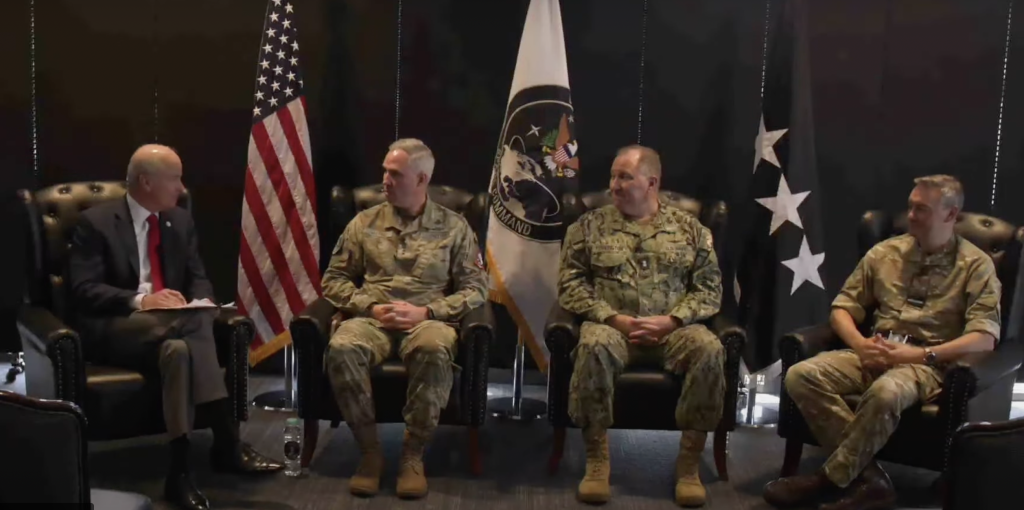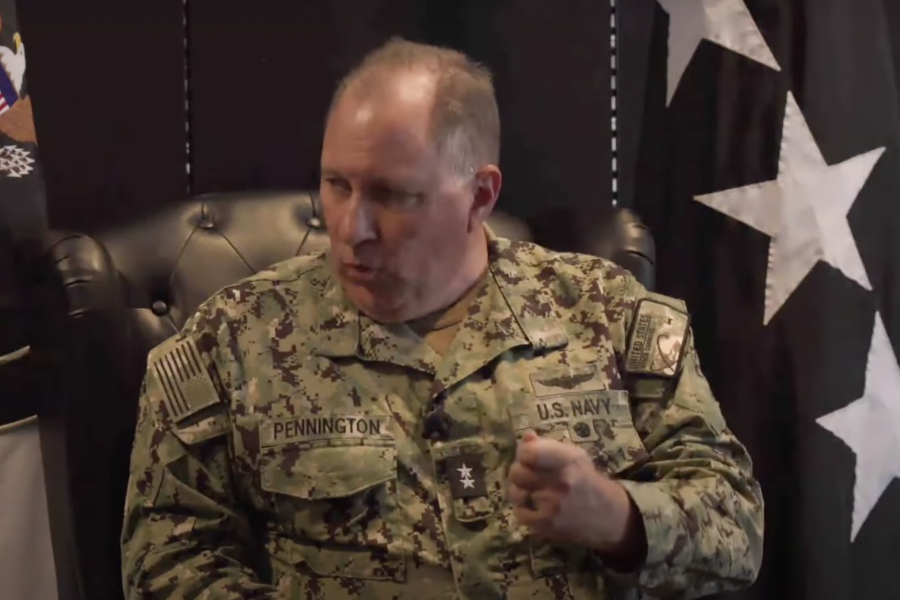U.S. Space Command leaders expressed support in recent weeks for contributions to the combatant command from all the military branches as they build space expertise and integrate it into their operations, amid a debate over how to balance the roles of the Space Force and other services’ space capabilities.
“When the command stood up, we did not have components from all of the services,” Navy Rear Adm. Will Pennington, SPACECOM chief of staff, said at a recent Mitchell Institute for Aerospace Studies event at Peterson Space Force Base, Colo. “And now, we have service components from the Army, the Air Force, the Marine Corps, and the Navy. … Beyond that, what the services have invested in, is the development of their force to have a greater understanding of space, therefore be able to serve a greater role in liaison and equity and to enable true multi-domain, joint force, and coalition force warfare.”
Each branch can bring its own specialized skills to tackle the challenges of space-based missions, Pennington suggested.

As an example, Pennington pointed to the Army’s Space Operations Officers, or FA 40, who remain pivotal even with the standup of the Space Force in late 2019. These specialists leverage space-based assets—like satellite communications, GPS, and missile warning systems—to support military missions and ensure space capabilities are integrated into Army operations, as the Army remains the largest user of satellite resources in the Department of Defense.
“That expertise has continued and remains incredibly important to us,” added Pennington.
Pennington’s remark comes on the heels of a recent Army proposal to create a space military occupational specialty (MOS) to build long-term expertise in the field. The commander of the Army’s Space and Missile Defense Command, Lt. Gen. Sean Gainey, has argued a dedicated MOS would allow Soldiers to specialize early, deepening expertise and cementing the Army’s stake in space.
“The Army has a place in space, and we need to continue leading the charge by giving our Soldiers every opportunity possible to become the experts we’ll turn to during the next conflict,” Gainey said at the Space and Missile Defense Conference last month.
The initiative is part of the Army’s broader ambition to carve out its own role in space. A key milestone came in January when senior leaders endorsed the Army Space Vision for multi-domain operations, declaring Army space professionals “critical” to the service’s readiness.
Some experts have raised doubts, however, arguing that the Army’s proposal duplicates efforts, wastes resources, undermines cooperation, and favors its own missions over joint operations.
“The Army should be stopped, and all resources involved should be revectored to the Space Force,” Charles Galbreath and Jennifer Reeves from the Mitchell Institute for Aerospace Studies argued in an op-ed, calling on the Secretary of Defense and Congress to step in. With the Space Force’s $30 billion budget this year dwarfed by the Army’s $185.5 billion, they called the Army’s move to fund its own space assets “ludicrous,” especially given the lack of growth in the Space Force budget.
In response, U.S. Space Command boss Gen. Stephen Whiting, also a member of the Space Force, noted space expertise doesn’t need to be exclusive to Guardians, backing the Army’s initiative. Two Army Space officers also offered their own op-ed in rebuttal, arguing the service has a vital role to play in space.
Other branches are also crafting new occupations dedicated to space as well. The Navy is training its own Maritime Space Officers to handle space operations full-time. Their mission is to integrate space capabilities into naval operations, support Navy and Marine Corps efforts, and sharpen space situational awareness for naval warfare. The Marines have developed space-focused military occupational specialties (MOS) as well, with the Maritime Space Officer leading the charge in the revamped 17XX Information Maneuver field.
According to Pennington, these personnel come from diverse warfare backgrounds—surface ships, submarines, aircraft, and information warfare roles like cryptology—before transitioning into space operations through specialized training. This eventually broadens the command’s expertise and ensures they have top talent ready for the final frontier.
“What that allows, just like we saw in an air operations center during our time in the Middle East, (is that) when you have a population of folks that are deeply steeped in joint warfare and processes, but have a baseline knowledge of space warfare, it really enables the synergy of the joint force,” said Pennington.
Beyond just skilled personnel, Pennington stressed a demand for capabilities required to secure space superiority. While the Space Force remains the “principal partner,” Pennington noted the critical role of other branches, especially in electronic warfare and cyber defense. He argued that a unified Joint Force effort is essential for protecting and exploiting space and cyber vulnerabilities for future operations.
“Having forces that can understand the space architecture well enough to be able to produce tools to help us both defend what we need to and possibly exploit enemy vulnerabilities is going to be incredibly important,” said Pennington. “So, it will remain very important that we have an all Joint Force effort moving forward, both in terms of personnel expertise, and in terms of capability.”
